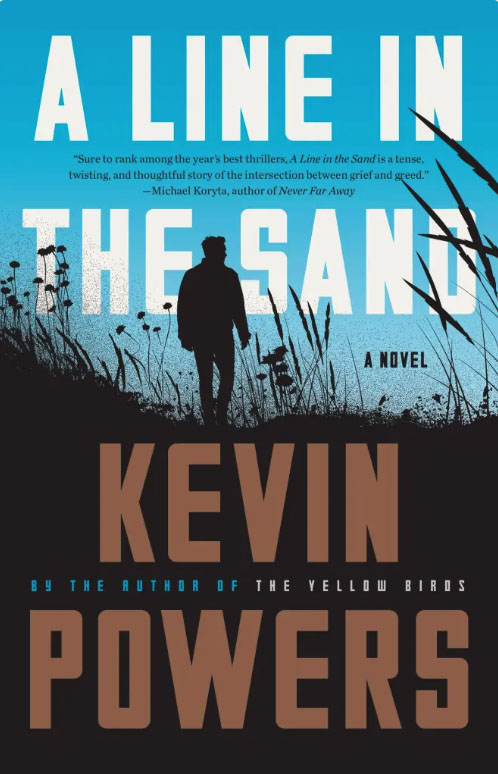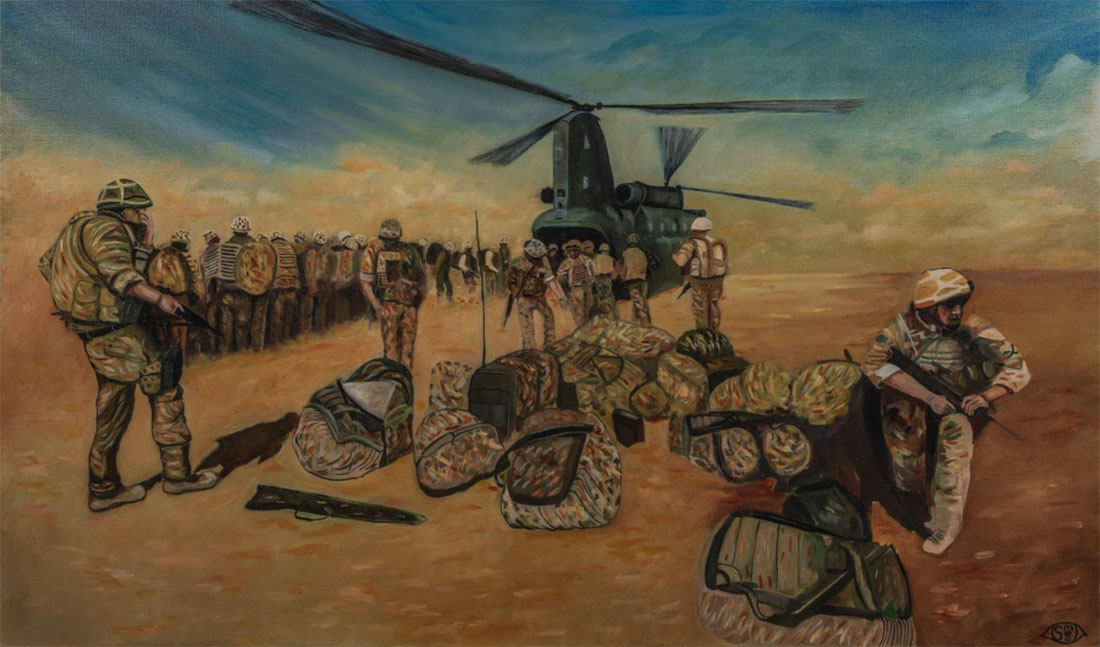A Line In the Sand, a novel by Kevin Powers
Little, Brown 2023
ISBN 9780316507127
Hamilton Cain
A little more than 10 years ago, Iraq War veteran Kevin Powers published his first novel, The Yellow Birds, the story of friendship and loss among two young soldiers, serving in Al Tafar, Iraq. He described their sergeant, a co-conspirator in the cover-up of a shooting gone wrong, as “excelled in death and brutality and domination” and in his preface, noted that he wrote the book as “an attempt to reckon with one question: what was it like over there?” The Yellow Birds was a finalist for the 2012 National Book Award and winner of the PEN/Hemingway prize. A few critics lauded it as an exemplary war novel from the American perspective.

With his new novel, the lean, noirish A Line In the Sand, Powers reconsiders the Iraq War through the prism of a police procedural. The Yellow Birds’ lyricism was subversive, its glossy sentences cutting against unspeakable horrors, whereas A Line In the Sand is edgy, hardboiled, and driven by dialogue. Powers’ technique has pivoted 180 degrees. From the swamps of Tidewater, Virginia to the chaotic streets of Mosul, he crosses lines literal and metaphorical, limning the atrocities he witnessed as a GI while pondering questions of war. We know who loses in conflicts between nations, but who really wins?
Set in Norfolk in the sultry summer of 2009, the novel opens with a body sprawled on the beach: a fit, forty-year-old male of Mediterranean origin, fully clothed. There’s no ID in his pockets; the tags of his expensive suit have been snipped. In the pre-dawn darkness, Arman Bajalan, a handyman at a local hotel, observes two men skulking away, muttering haji, an Arabic term for “pilgrim” that US soldiers serving abroad popularized as a slur; they hadn’t noticed him lurking in the shadows near a bathhouse. Arman calls 3-1-1 after discovering the body where tide-washed sand and beachgrass meet in a cursory line. No sign of the murder weapon, a gun with a silencer.
Four years earlier, Arman had been serving as a translator assigned to American troops engaged in combat among Mosul’s shelled buildings. After back-to-back tragedies, a massacre he recorded on his cellphone followed by the murder of his wife and young son, he fled the strife, aided by a sympathetic lieutenant, and relocated to Virginia for safekeeping. (The video has vanished into the maze of our government’s bureaucracies.) Arman’s torso is riddled with scars, but it’s the psychic scars that throb. He knows things other people — powerful people — would kill for, but he’s settled into an off-the-grid life with a studio apartment and an affectionate relationship with his boss, the elderly, gruff Mr. Peters, a Korean War veteran. Arman is overwhelmed by anguish, but moves stoically through his simple routines.
Catherine “Cat” Wheel and her junior partner, Lamar Adams, helm the homicide investigation for the Norfolk Police Department. In her mid-forties, with “a wave of curls, red going gray,” Cat’s a pro, the daughter of a rural county sheriff, fond of cigarettes and sarcasm. She’s risen in a man’s world, acclimating well and earning the respect of her colleagues. Her camaraderie with warm-hearted Lamar, a recently discharged soldier, fuels Powers’ plot.
Other stories unfold in Norfolk. Sally Ewell, a reporter at the Virginian-Pilot, grapples with alcoholism and a piercing grief for her slain brother, interred at Arlington Cemetery. Her career’s on the skids: one false start and she’s out the door. She’s running down leads connected to the shady Decision Tree, a private enterprise owned by the well-groomed Trevor Graves, a military contractor in business with the Department of Defense. As Powers suggests, Graves puts people in graves, even innocent civilians half a world away.
While Cat spurs the inquiry forward, she and Adams stumble across more corpses, intimations of a vast conspiracy. Powers taps the details of an era already in our rearview mirror: Nokia flip phones, Merrell boots. He writes in a clipped yet urgent cadence, as in the aftermath of a shooting:
His head hurt so goddamn bad. He knew the eye was gone. Bet your ass the cops at the bridge heard the long-gun fire. He had maybe five minutes to put them down, get to the water, and then what? Find an emergency room? He would have to drive another five minutes inland when he got to the truck to get cell service. Maybe get Chris to have one of the company docs meet him on the down-low in a motel somewhere.
The novel’s omniscient point of view is subtle yet panoramic. Powers glides in and out of his characters’ minds; they are players in a particular drama but also pawns in a larger game. And yet he distills a generosity from their actions, as when a group of teenagers steal beer and smokes from a pub. Consider Powers’ skill as he shifts perspective in this paragraph’s closing sentence:
A cloud of sand white as the moon rose from their back wheels in the sodium-vapor lamplight as they scrambled down out of the parking lot and turned down the sidewalk toward Ocean View Beach Park. The oldest boy looked behind him and saw the barman come out of the building. He lingered in his looking, the boy half believing he saw grief or sadness in the barman’s expression. The barman stayed too and watched the figures fade into the night as if they had been ghosts come to visit from his own distant youth.
Good people do bad things. A Line In the Sand not only peels away layers of violence (mostly inflicted by men), but also interrogates the corruption of our body politic, which is increasingly dependent on technology to survive. Borders between nations have dissolved, thanks in no small part to the internet. Trust is porous: Arman’s allies betrayed him, and one of Sally’s intimates threatens to double-cross her. The only trust that matters, as Hernan Diaz underscored in his Pulitzer Prize-winning novel, Trust, is trust in greed. Follow the money, Cat realizes.
One line Powers crosses is political: the boundary between the Bush and Obama administrations. Will the new administration, elected on a platform of smarter, more robust internationalism, deliver on its promises? Again, Powers points an accusatory finger at both major political parties: the Iraq war dragged on until 2011, and U.S. forces only withdrew from Afghanistan during the first year of Biden’s presidency.
A Line In the Sand, then, is a searching critique of our foreign policy from a compassionate author who knows of what he writes. I suspect a critic of American entanglements who hails from the Middle East would still find the novel frustratingly naïve. Nonetheless, Powers’ morality tale is affecting, depicted in a terse yet vibrant prose, and held in check by the scaffolding of the thriller form. The mercenaries among us wear Prada suits just as comfortably as commando fatigues.




